Ford Transit Bus vs SEAT Leon – Differences & prices compared
Compare performance, boot space, consumption and price in one view.
Find out now: which car is the better choice for you – Ford Transit Bus or SEAT Leon?
The Ford Transit Bus (Bus) comes with a Diesel engine and Automatic transmission. In comparison, the SEAT Leon (Hatchback) features a Petrol, Petrol MHEV, Diesel or Plugin Hybrid engine with Manuel or Automatic transmission.
When it comes to boot capacity, the Ford Transit Bus offers 0 L, while the SEAT Leon provides 380 L – depending on how much space you need. If you’re looking for more power, decide whether the 150 HP of the Ford Transit Bus or the 272 HP of the SEAT Leon suits your needs better.
In terms of consumption, the values are 9.40 L per 100 km for the Ford Transit Bus, and 0.30 L for the SEAT Leon.
Price-wise, the Ford Transit Bus starts at 50500 £, while the SEAT Leon is available from 24500 £. Compare all the details and find out which model fits your lifestyle best!
Ford Transit Bus
The Ford Transit Bus is renowned for its robust performance and spacious interior, making it an ideal choice for both commercial and personal use. With its efficient handling and modern design, it effortlessly combines practicality with comfort. Its adaptability and versatility ensure it meets the demands of various driving needs, from urban transport to long-distance journeys.
details @ media.ford.com
@ media.ford.com
 @ media.ford.com
@ media.ford.com
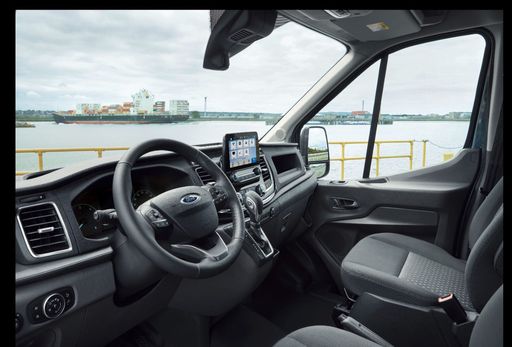 @ media.ford.com
@ media.ford.com
SEAT Leon
The SEAT Leon impresses with its dynamic design and sporty edge, making it a standout choice in its class. Its interior is characterised by a modern, driver-focused cockpit that combines functionality with an emphasis on comfort. The car delivers a responsive driving experience, thanks to its advanced engineering and agile handling capabilities.
details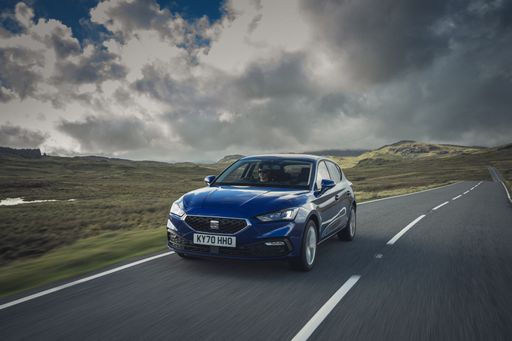 @ seatmedia
@ seatmedia
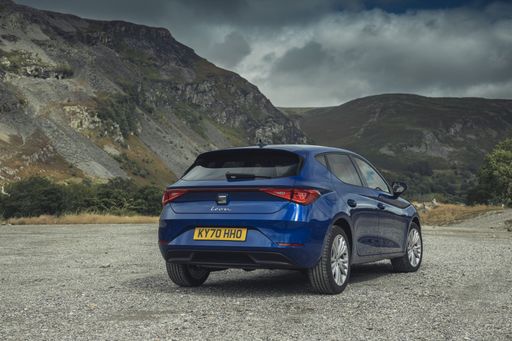 @ seatmedia
@ seatmedia
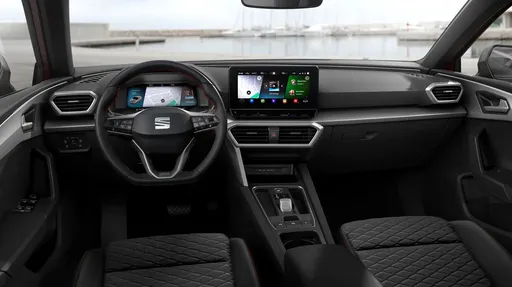 @ seatmedia
@ seatmedia
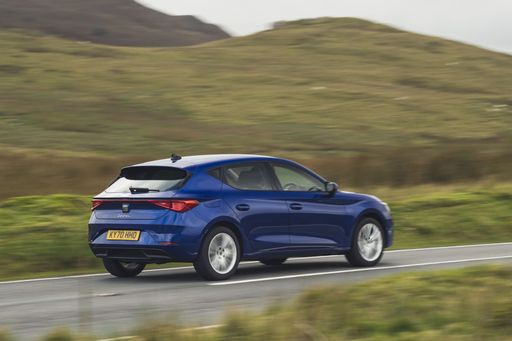 @ seatmedia
@ seatmedia

|

|
|
|
|
Costs and Consumption |
|
|---|---|
|
Price
50500 - 52900 £
|
Price
24500 - 36400 £
|
|
Consumption L/100km
9.4 - 9.5 L
|
Consumption L/100km
0.3 - 5.7 L
|
|
Consumption kWh/100km
-
|
Consumption kWh/100km
-
|
|
Electric Range
-
|
Electric Range
133 - 134 km
|
|
Battery Capacity
-
|
Battery Capacity
19.70 kWh
|
|
co2
245 - 248 g/km
|
co2
7 - 129 g/km
|
|
Fuel tank capacity
70 L
|
Fuel tank capacity
40 - 45 L
|
Dimensions and Body |
|
|---|---|
|
Body Type
Bus
|
Body Type
Hatchback
|
|
Seats
9
|
Seats
5
|
|
Doors
4
|
Doors
5
|
|
Curb weight
2338 - 2385 kg
|
Curb weight
1344 - 1670 kg
|
|
Trunk capacity
0 L
|
Trunk capacity
270 - 380 L
|
|
Length
5531 - 5981 mm
|
Length
4368 mm
|
|
Width
2059 mm
|
Width
1799 mm
|
|
Height
2530 - 2533 mm
|
Height
1442 - 1460 mm
|
|
Payload
1115 - 1162 kg
|
Payload
460 - 521 kg
|
Engine and Performance |
|
|---|---|
|
Engine Type
Diesel
|
Engine Type
Petrol, Petrol MHEV, Diesel, Plugin Hybrid
|
|
Transmission
Automatic
|
Transmission
Manuel, Automatic
|
|
Transmission Detail
Automatic Gearbox
|
Transmission Detail
Manual Gearbox, Dual-Clutch Automatic
|
|
Drive Type
Front-Wheel Drive
|
Drive Type
Front-Wheel Drive
|
|
Power HP
130 - 150 HP
|
Power HP
110 - 272 HP
|
|
Acceleration 0-100km/h
-
|
Acceleration 0-100km/h
7.7 - 10.5 s
|
|
Max Speed
-
|
Max Speed
197 - 220 km/h
|
|
Torque
360 - 390 Nm
|
Torque
220 - 360 Nm
|
|
Number of Cylinders
4
|
Number of Cylinders
4
|
|
Power kW
96 - 110 kW
|
Power kW
85 - 200 kW
|
|
Engine capacity
1995 cm3
|
Engine capacity
1498 - 1968 cm3
|
General |
|
|---|---|
|
Model Year
2024
|
Model Year
2024 - 2025
|
|
CO2 Efficiency Class
G
|
CO2 Efficiency Class
D, B
|
|
Brand
Ford
|
Brand
SEAT
|
Ford Transit Bus
The Versatile Ford Transit Bus from Ford
The Ford Transit Bus has always been a leader in the category of commercial passenger vehicles, and the 2024 model continues this legacy with a blend of reliability, innovation and modern design. With a range of configurations, the Ford Transit Bus is aimed at meeting the needs of businesses and individuals who require a spacious, dependable mode of transport.
Under the Bonnet: Technical Mastery
Power comes from a 2.0 EcoBlue diesel engine, available in power outputs of 130 and 150 PS. The engine is combined with an automatic transmission, ensuring a smooth drive even when fully laden. This Euro 6 compliant powerplant is designed for efficiency without sacrificing performance, sporting a fuel consumption range of 9.4 to 9.5 L/100km and an associated CO2 output of 245 to 248 g/km. Such numbers ensure that the Ford Transit Bus strikes a balance between power and economy.
Room to Spare: Exceptional Capacity and Comfort
The Ford Transit Bus is not just about getting from A to B; it’s about transporting passengers with utmost comfort. Depending on the specifications, the bus can accommodate between eight to nine passengers. The spacious interior is accompanied by an array of comfort features under the ‘Trend Automatik’ trim level, offering a practical and enjoyable ride experience for both drivers and passengers alike.
Dimensions and Practicality
Designed with practicality in mind, the Ford Transit Bus boasts dimensions that are fully suited to a variety of professional needs. Its length ranges from 5531 to 5981 mm, with a consistent width of 2059 mm and a height range from 2530 to 2533 mm. This translates to a generous loading capacity with a payload ranging from 789 to 1162 kg, making it a versatile option for businesses requiring ample cargo space alongside passenger accommodation.
Advanced Technology for Modern Roads
Aside from its primary function as a people mover, the Ford Transit Bus also shines with its technological prowess. It integrates advanced driver assistance systems aimed at ensuring both active and passive safety. This includes features that help drivers navigate through complex traffic situations and ensure maximum safety for all passengers.
A Smart Investment
The Ford Transit Bus is a competitive contender in its segment, offering not just performance and reliability but also reasonable costing. With monthly running costs ranging from €1,654 to €1,730 and cost per kilometre between 66.2 and 69.2 cents, businesses can expect an affordable operation without unexpected hikes in upkeep costs.
In conclusion, the Ford Transit Bus remains a clear front-runner among its peers, offering a combination of cutting-edge technology, impressive fuel efficiency, and a spacious, comfortable interior. Whether you are looking to enhance your fleet or need a robust transport solution, the Ford Transit Bus is a sound choice for the discerning buyer in 2024.
SEAT Leon
The SEAT Leon: A Blend of Performance and Innovation
The SEAT Leon has firmly established itself as a standout model, blending sleek aesthetics with cutting-edge technology. Known for its versatility and dynamic performance, this hatchback has become a staple choice for drivers seeking style and substance. Join us as we delve into the technical intricacies and innovative features that make the SEAT Leon a formidable contender in its class.
Dynamic Engine Options
The SEAT Leon offers a diverse range of engine choices, catering to various driving preferences. From efficient petrol options with mild-hybrid technology to powerful diesel engines, the Leon provides an impressive power range between 110 to 204 PS. Drivers can also opt for the environmentally friendly plug-in hybrid, featuring a 1.4 e-HYBRID powertrain that boasts a consumption rate as low as 1.1 L/100km and an electric range of up to 63 km.
Advanced Transmission Systems
Optimising driving efficiency, the SEAT Leon is available with both a manual gearbox and an advanced automatic dual-clutch transmission (DSG). The DSG offers seamless gear changes, enhancing the driving experience by providing precise control and improved fuel economy. This versatility allows the Leon to cater to drivers who appreciate the traditional feel of manual shifting and those who prefer the convenience of automatic transmissions.
Intelligent Design and Comfort
The SEAT Leon’s interior is designed with the modern driver in mind. Sporting a spacious cabin accommodating up to five passengers, it provides a balance of comfort and functionality. The boot space ranges from 270 to 380 litres, ensuring ample room for luggage. The Leon's ergonomic layout, coupled with optional advanced features such as ambient lighting and premium upholstery, positions it as a leader in comfort and practicality.
Cutting-edge Technology and Safety
The SEAT Leon is not just about performance; safety features prominently in its design. It is equipped with the latest driver assistance systems, such as adaptive cruise control and lane-keeping assist, ensuring a safer driving experience. The infotainment system offers seamless connectivity, supporting both Android Auto and Apple CarPlay, enabling drivers to stay connected while on the road.
Efficiency and Sustainable Driving
Emphasising sustainability, the SEAT Leon offers CO2 emissions ranging from 25 to 132 g/km, showcasing its commitment to environmental responsibility. Fuel consumption varies between a thrifty 1.1 to 5.8 L/100km, catering to both eco-conscious drivers and those focused on performance. With a competitive price range, the Leon stands out as an economical choice in its segment, balancing initial cost and long-term benefits.
Conclusion
The SEAT Leon continues to set benchmarks with its combination of style, performance, and technological innovation. Its array of engine options, advanced safety features, and luxurious interior make it a compelling choice for modern drivers. Whether you prioritise fuel efficiency, power, or comfort, the SEAT Leon offers a tailored driving experience unmatched in its class.
The prices and data displayed are estimates based on German list prices and may vary by country. This information is not legally binding.
